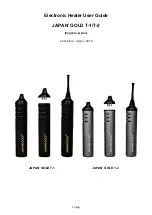
Rear view of cabinet
ASSOCIATED EQUIPMENT
The SCS3 is a very high quality sound reproducer and will
benefit from use with the best associated equipment. Since it is
extremely accurate, it will reveal sources of distortion generated
elsewhere in the system. For example, distortion resulting from
poor recordings or inferior electronics will be reproduced
accurately. Also, the quality of the interconnect cables and
speaker cables will significantly effect the performance of the
system.
POWER REQUIREMENTS
It is important to have enough power to play at the level you
desire without distortion. If high sound levels are desired, the
SCS3’s are designed to be used with amplifiers rated up to 300
watts per channel into 8 ohms. If you play the speakers more
loudly than the volume the amplifier can cleanly produce, the
amplifier will produce overload (clipping) distortion. The sound
will become compressed, strained, and in extreme cases,
obviously distorted. This distortion is actually non-musical
additional energy and since it is concentrated in the high
frequency region where the speaker is least able to handle it,
tweeters can be damaged in extreme cases.
Since the SCS3 provides a 4 ohm load to the amplifier, it is
important that the amplifier be rated to deliver at least 50 percent
more power into a 4 ohm load than it does into an 8 ohm load.
Keep in mind that sound quality is usually much more
important than sound quantity. There can be large differences in
the sonic performance of two amplifiers of equal power, and this is more important than large differences in power. Most
everyone will be happier with a 100 watt amplifier of high sonic quality than a 200 watt amplifier of mediocre sonic quality.
For this reason, we feel there is no substitute for listening in making your amplifier decision.
The question “how much power do I need?” does not have the simple answer most people expect because it is not
determined only by the loudspeaker’s efficiency, but also by the volume desired and the size of the room. If all three factors
are average, about 100 watts per channel is required. Each factor can raise or lower this amount by about three times.
1) Usually, people who “don’t like music loud” can decrease their power to about one-half. Also, people who like music
loud should increase their power by 2 times or more. Most people fall within a normal range.
2) A speaker with a low efficiency of 84dB/W-m will require twice the power of an average 87dB/W-m speaker and one
with a high rating of 90dB/W-m will require only half the power of an average speaker. The SCS3 is of average efficiency
(87dB) and therefore can achieve average output levels with an average amount of power.
3) A small room will need less power for a given loudness level than a large room. A very small room of 1000 cu ft (11' x
11' with an 8' ceiling) will require about half the power of an average size room. A large room of 6000 cu ft (20' x 30' with a
10' ceiling) will require twice the average power. If the listening room is connected to another room by a large open area, the
required power will increase, but not by the amount of the combined room volume. If the room has a “dropped” ceiling with
light panels, the ceiling will be almost transparent acoustically and the space above the ceiling should be added. If the panels
are heavy they will act as a more normal ceiling.
With all this in mind, a person who doesn’t like to play music very loudly and has a small room can get quality sound with
as little as 50 watts whereas a person who sometimes likes to play loudly and has a large room may need 300 watts or more.
Input
terminals
THIEL
Manufactured by THIEL Lexington, Kentucky USA
MODEL
SCS 3
ASSEMBLED AND TESTED BY
Coherent Source
Loudspeaker
®
SN
























